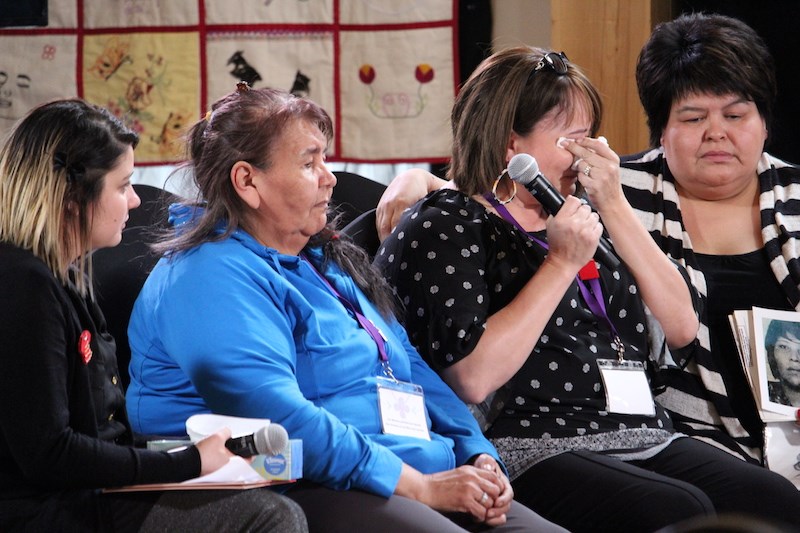Frustration, despair and anger permeated Riverlodge Place March 21, as the National Inquiry into Missing and Murdered Indigenous Women and Girls (MMIWG) wrapped up their two days of community hearings in Thompson.
All these emotions were on full display during the testimony of Janet Lowther and Helen Bignell, who shared the story of their missing sister and daughter Amanda Bartlett.
According to the pair, Bartlett went missing in mid-1996 when she left home in The Pas to attend high school in Winnipeg. In the intervening 22 years, Lowther and Bignell haven’t heard from her.
Outside of the pure, raw hurt associated with this kind of loss, much of Lowther’s testimony focused on her interactions with the police and how the case wasn’t taken seriously, especially when compared the disappearance of non-Aboriginal missing persons in that same area like Winnipeg grandmother Thelma Krull.
Not only did the police in both The Pas and Winnipeg refuse to claim responsibility for taking on this missing persons case, but Lowther said she was repeatedly “slapped in the face” with disparaging comments from the officers themselves.
“One cop in Winnipeg he says ‘Aw Janet. I’m sorry. We don’t do family reunions here,’” she said. “And then another cop [said] ‘Janet, six years went by. Why are you even bothering?’”
Despite repeatedly hitting a brick wall, Lowther eventually took matters into her own hands by making up her own missing person posters and putting them up at homeless shelters, bus depots and airports.
Bignell even admitted during the hearing that she consulted with a medium and a medicine man in the hopes of finding out anything about her daughter.
However, Lowther said she’s since given up looking for her sister and is now focusing most of her energy on educating her four daughters about how to stay safe, since she said the legal system doesn’t look out for Indigenous people.
“I have to sit at home and I have to teach my girls … that in the eyes of society, Canadian society, we’re not valued as much as the other race. I have to tell them that. I’m not going to sugar coat it because that’s how I protect them.”
Unfortunately, Wednesday’s hearings revealed that knowing the fate of a loved one doesn’t make things any better.
This was evident during the testimony of Christine Merasty and Susan Clipping, whose mother and sister Clara Dantouze was murdered in 1973 at the age of 21.
Even though Dantouze’s killer was eventually caught, Clipping, who used to live in Brochet and now resides in Tadoule Lake, revealed that their family was kept at arm’s length by the Winnipeg police and never learned any real details surrounding the circumstances of her murder.
“But there was no names mentioned, there was no details about it. It didn’t come from the cops. The cops let us know through a third party,” she said. “They never came up to us … a [local] minister relayed the message to us.”
To make this situation even worse, Merasty never got to really meet her mother, since she was given up for adoption at four months old as part of the Sixties Scoop.
“It was very sad for me, because I grew up wondering, my whole life … why do I look the way I do? Who gave me these traits?” she said.
“But then when I meet my family, when I meet my grandparents, they loved me. So I wondered why the government never asked them to take me? Then I could have had a home, something I didn’t have.”
Commissioner Michèle Audette wrapped up Wednesday’s proceedings by thanking all the witnesses who provided testimony over the last two days.
She also took some time to remind the public how widespread these problems are for the Indigenous people throughout the country, since this is not the first time that these specific issues have been brought to the inquiry’s attention.
“I heard things [today] that made me mad, that made me sad, made me cry, and gave me hope also. But what made me mad and sad is that no matter where we go … we hear the same thing.”
“So that tells us that there is something wrong. We know that ... but the people who make the rules, the laws, the legislation or change the legislation, they need to hear it.”
The next community hearing for the national inquiry is set to take place in Vancouver, B.C. from April 4 to 8.




